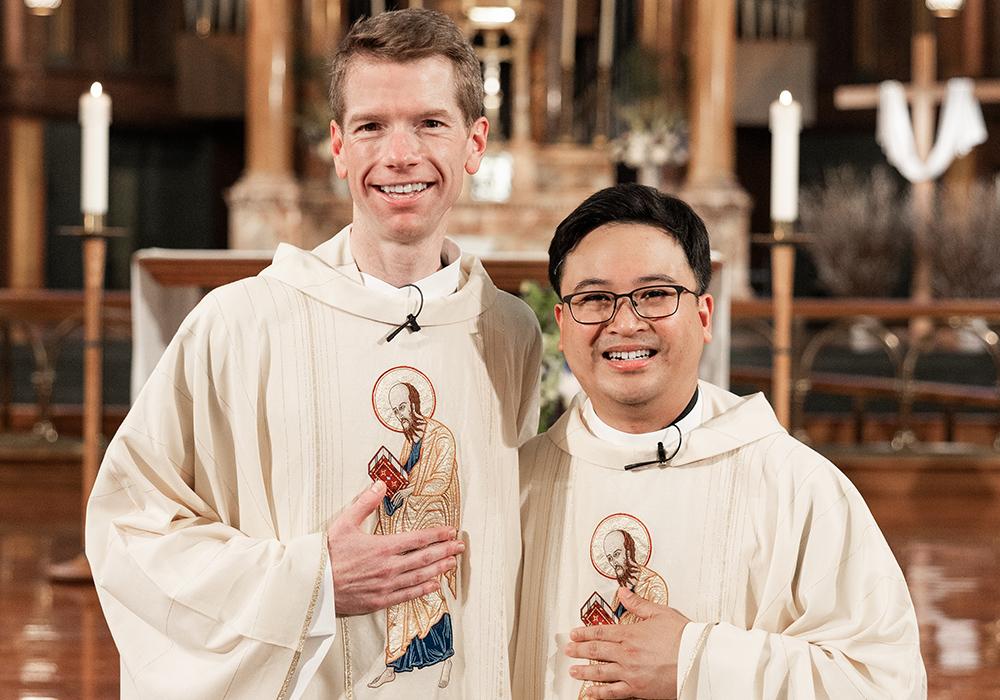
Paulists Fr. Chris Lawton and Fr. Dan Macalinao are pictured after their ordination Mass, at St. Paul The Apostle Church on May 18 in New York City. (Courtesy of Zachera Wollenberg)
On a warm Sunday afternoon in 2007, Chris Lawton, then a 22-year-old premed student at Harvard, was studying in his bedroom, waiting anxiously for a response from Columbia University, about whether or not he had been admitted to begin medical school that August.
He remembered receiving a note about an incoming package, but still had not checked his mailbox. The package was still there, and on it was the stamp of Columbia University. As he had dreamed for months, Lawton had been admitted to medical school, and would soon be moving to New York.
Three years earlier in March 2004, then-17-year-old Dan Macalinao received another package in his native home in Manila, the capital of the Philippines, announcing he had been admitted to Wesleyan University in Middletown, Connecticut, to study molecular biology and biochemistry on a full scholarship.
Macalinao could hardly believe he had been selected to move to the U.S. to fulfill a lifelong dream. His parents had been clear from the very beginning in telling him that they could never afford tuition at an American college. The scholarship Wesleyan gave their son changed their minds.
Lawton and Macalinao could not imagine that the scientific plans they had set in their lives would one day take an unexpected turn. They both decided to leave everything behind in 2018 and enter seminary together, eventually to be ordained Paulist priests this May 18.
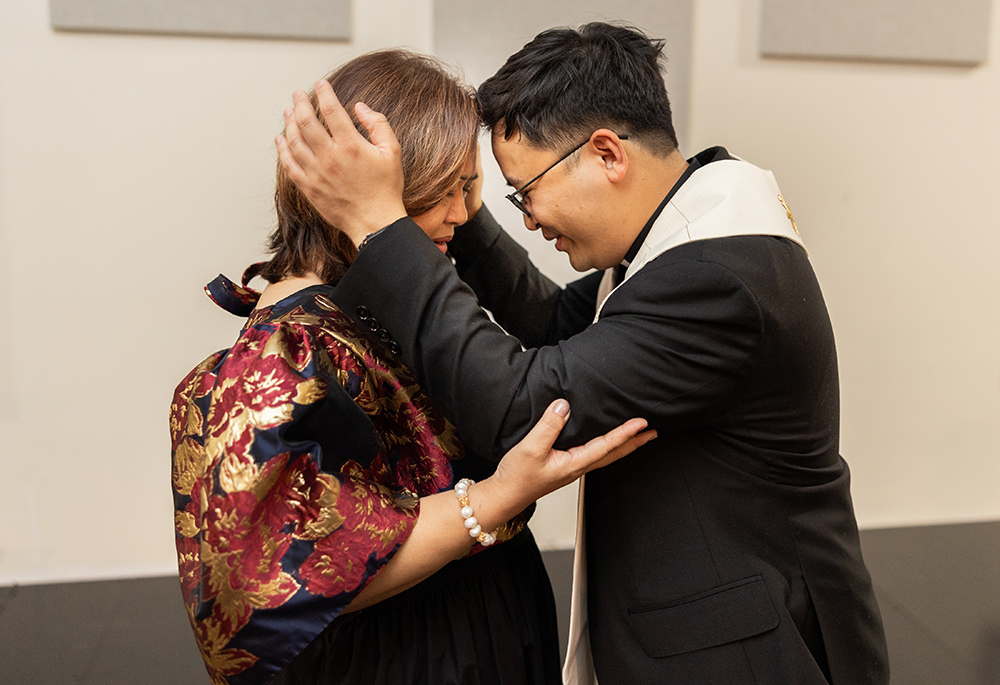
Paulist Fr. Dan Macalinao blesses his mother during his ordination Mass on May 18. (Courtesy of Zachera Wollenberg)
After more than five years together as young parish friends at St. Paul The Apostle Church in New York City, in 2017 Lawton left his job as a medical doctor specialized in palliative care, and Macalinao finished his doctorate in cancer biology at Gerstner Sloan Kettering Graduate School of Biomedical Sciences, where he had landed after Wesleyan and another research project in Maine.
They moved to Washington, D.C., and entered the Paulists. Beginning July 1, Lawton will be associate pastor at St. Paul the Apostle in New York, and Macalino will be associate pastor at Old St. Mary's Parish in Chicago.
Founded in 1858 by Servant of God Isaac Hecker, the Paulist Fathers is a uniquely American congregation that has as its core mission outreach and full inclusion of people left on the margins and existential peripheries of the Catholic Church in the U.S., such as people of color, women, young adults in their 20s and 30s, the Catholic LGBTQ community, and Catholics who want to reconnect with the church after years of spiritual distance.
Like Catholic congregations around the world, however, the Paulists are experiencing a crisis of vocations that has brought the number of ordained priests down to 95 over the past two decades, including the newly ordained Lawton and Macalinao.
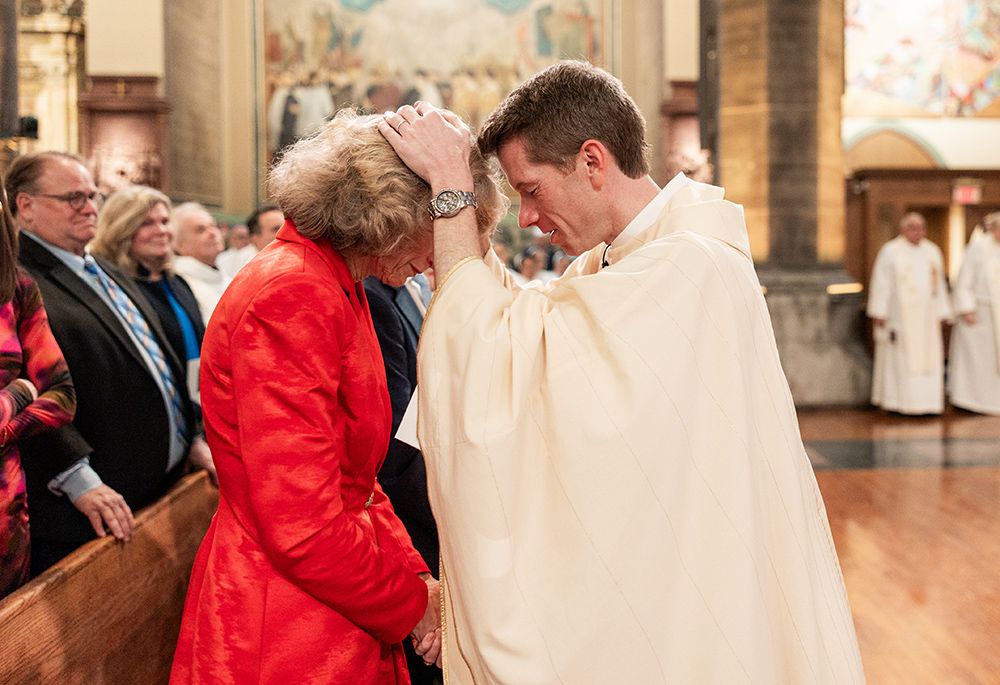
Paulist Fr. Chris Lawton blesses his mother during his ordination Mass on May 18. (Courtesy of Zachera Wollenberg)
Having no specific preference on a specialization to pursue at medical school, Lawton decided to go for internal medicine. Over time, however, Lawton became increasingly fascinated by palliative and hospice medicine, which is the care given to the terminally ill to accompany them to death with as little physical suffering as possible. "I knew more than other people I worked with that I was really interested in talking to patients," Lawton explained to NCR.
Thinking back to the most tragic moments in his work as a physician when he and his colleagues were asked to speak with relatives of suffering patients, Lawton understood that many of his colleagues "weren't looking forward to it," but he was. Lawton increasingly felt called to spend more time sitting with the families of patients receiving difficult diagnoses.
"What you do learn in medicine, if you're paying attention, is that so much of medicine itself is unfixable. We still treat death in this country like a curable illness. We know that it's not. We need people — whether they're great physicians or great priests — who are going to sit with people in the messiness of terrible things happening in their lives," he said.
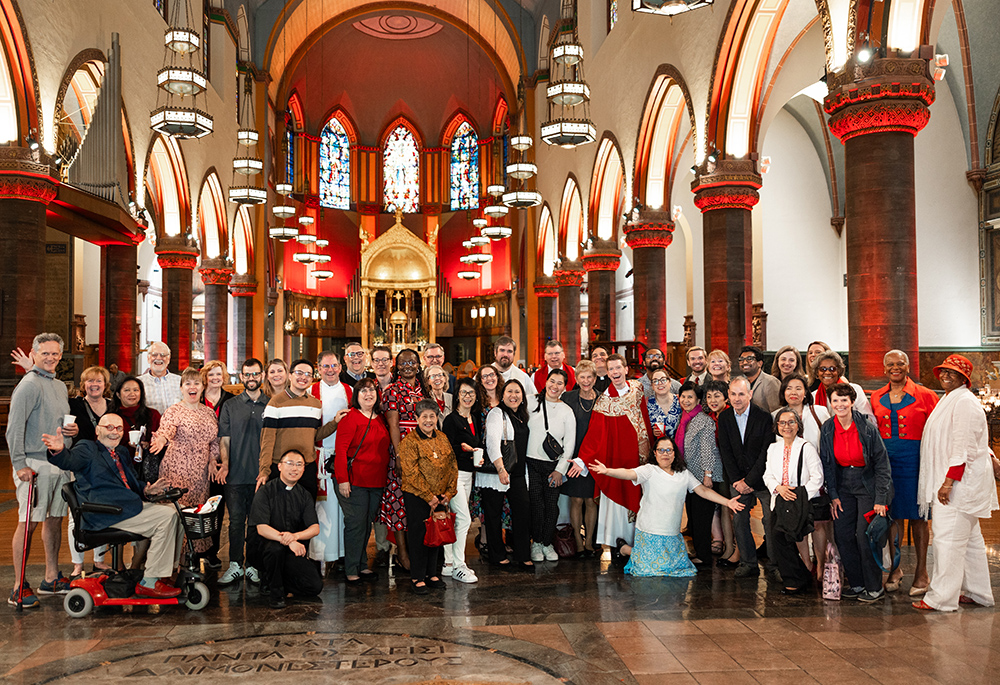
Paulist Fr. Chris Lawton with a group of friends and parishioners after his first Mass, on May 19 (Courtesy of Zachera Wollenberg)
Macalinao, too, in the course of his career as a biological researcher stumbled upon the study of the advanced stages of multiple types of cancer, to arrive at the same spiritual conclusions as Lawton. "Some of the most amazing scientists I've ever worked with have always had the humility to say that science can never, never tell you, or give you the entire picture," he said.
In 2016, Macalinao was the second author in a paper that was published in the prominent scientific peer-reviewed journal Cell. The study was about so-called "metastatic latency" or "dormancy," a phenomenon that explains how cancer cells that start in a tumor can grow through a person's bloodstream without any clear notice for months and years, eventually causing the patient's death.
"The humbling thing about science is that you never come to a final answer. Every new discovery leads to a further question, which then will lead you to further questions and so on. As someone who was born and raised Catholic, there's an immense reverence in terms of just my own sense of wonder and awe at how creation manifests," Macalinao said.
Advertisement
After moving back to his native hometown of Milwaukee in 2016 to work as a palliative care specialist at the Medical College of Wisconsin, Lawton "couldn't stop thinking about the Paulists and this mission of welcoming people and being so open and willing to explore issues of faith, especially for those on the margins of the church."
Before then, the then-pastor of St. Paul the Apostle in New York, Paulist Fr. Gil Martinez, told him while they were walking on Manhattan's Upper West Side, "I'm only going to say this once, because I have to tell you. I think you would make a very good Paulist."
Both Lawton and Macalinao were committed to multiple ministries in the parish each week, and in just a few years they had become leaders and anchors for parishioners of all ages. Macalinao was the sound engineer for the 10 a.m. Sunday Mass, co-director of the Spanish choir at the 12:30 p.m. Sunday Mass, and cantor and sound engineer for the 5:15 p.m. Young Adults Sunday Mass. Both of them used to spend the majority of their free time at the parish. At one point, the Paulists noticed, and asked them to explore their possible vocations.
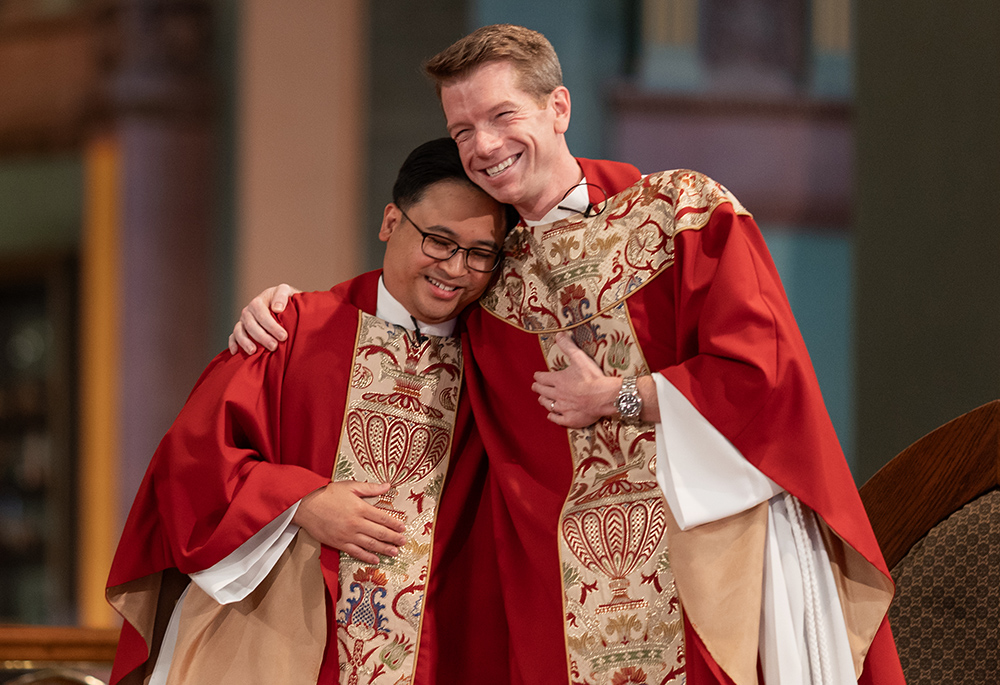
Paulists Fr. Chris Lawton and Fr. Dan Macalinao are pictured at the end of their first Mass together on May 19. (Courtesy of Zachera Wollenberg)
The then-vocation director Paulist Fr. Dat Tran invited both Lawton and Macalinao to lunch or dinner several times to answer all their questions and allay their anxieties about priesthood. "I just told them that God doesn't waste anything. Whatever you know as a doctor or a researcher, that will come with you to be a priest. We all bring our uniqueness, our gifts, and a specific background into our priesthood. It's not like a complete break," Tran told NCR.
One of the first parish friends who learned of Lawton and Macalinao's desire to enter seminary was Larry Holodak, a 61-year-old financial services operator who has been a parishioner at St. Paul's for more than 15 years. When Lawton after a Sunday afternoon Mass pulled him aside to timidly ask his opinion on the matter, Holodak smiled and just answered, "How can I help?"
After Lawton and Macalinao moved to Washington, D.C., for a year of novitiate and then to enter the seminary, Holodak visited them monthly, called them, checked in on them over Zoom and took them out to dinner. When due to the death in 2020 of the seminary's spiritual director, Paulist Fr. Rich Colgan, Macalinao and Lawton experienced a period of deep desolation, Holodak traveled multiple times to Washington to spend more time with them.
Similarly, both of Holodak's parents died two years apart during the same time they were in seminary, and Lawton and Macalinao showed up for him in New York.
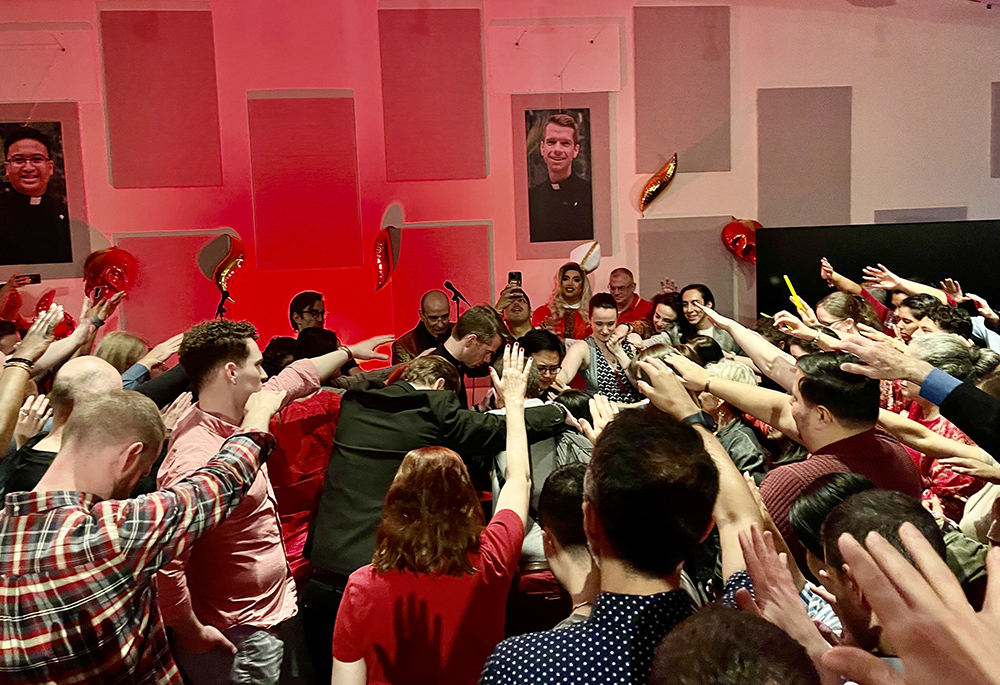
Parishioners and friends blessing newly ordained Paulists Fr. Christ Lawton and Fr. Dan Macalinao after their first Masses on May 19 (NCR photo/Camillo Barone)
"My vocation is to be a good friend to priests. I think that's one of the missing links. A lot of people have preconceived notions about what that could look like, but I have received so many graces from these people and the only way I've known how to respond is to be a good friend to people who were shepherds and good friends to me," Holodak said.
Asked what his greatest concern is for his friends as priests, Holodak said: "When we were growing up, I think priests were an authority and revered figure, and not somebody who is necessarily approachable, almost not human in some respects."
"If you are raised like that, many people see priests as something other, meaning other than people who have friends, people who like to share a meal, people who need friends," he said. "That can become a very lonely life."
Rehema Kutua, a 38-year-old pediatrician who grew up in Botswana and has become one of Lawton's best friends since starting premed at Harvard, traveled to New York on May 18 to attend Lawton's ordination. Although Kutua does not consider herself Catholic and says her faith "is evolving," during her friend's ordination Mass she could not hold back tears, she told NCR.
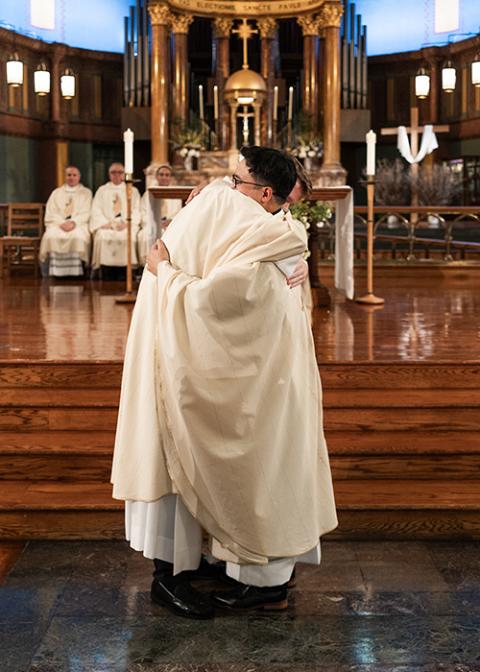
Paulists Fr. Chris Lawton and Fr. Dan Macalinao hug each other after wearing their first chasubles during the ordination ceremony, on May 18. (Courtesy of Zachera Wollenberg)
"Chris gives me hope for the future of organized religion. I have a daughter who is being raised Catholic, and I've had my reservations to be honest. Chris has made me hopeful for the future of Catholicism, for the idea that my daughter could feel safe and seen and heard, grow and be a better person," she said. "I just felt really excited for the future, not just for him but for the future of the church and the people that he's going to touch and bless."
Paulist Fr. Dat Tran said being a priest in today's world has become even more challenging, especially in a congregation as open to the world as the Paulists. "We live in a context of a more polarized world, but this is the mission and charism that we as Paulists want to bring to the world, to bring healing and to be a bridge of divisions. As people are going more to the extremes, how can we bring people together? How can you be in the middle and speak and preach the truth and the Gospel and not add to the division?" he said.
Lawton, now newly ordained, said that he is aware of these challenges, but that over the years in seminary he has learned to know how to live with these same fears.
To explain further, he used a comparison with a medical scenario, and asked himself, "What would you say to someone who was getting married, and their [partner] had an illness that may or may not lead to a shorter life and complications? Would they not get married? Would I not commit my life to something that I believed in the deepest part of me in my relationship with God, just because the future was uncertain?"
"No, I wouldn't," he said. "I feel deeply called to this."








